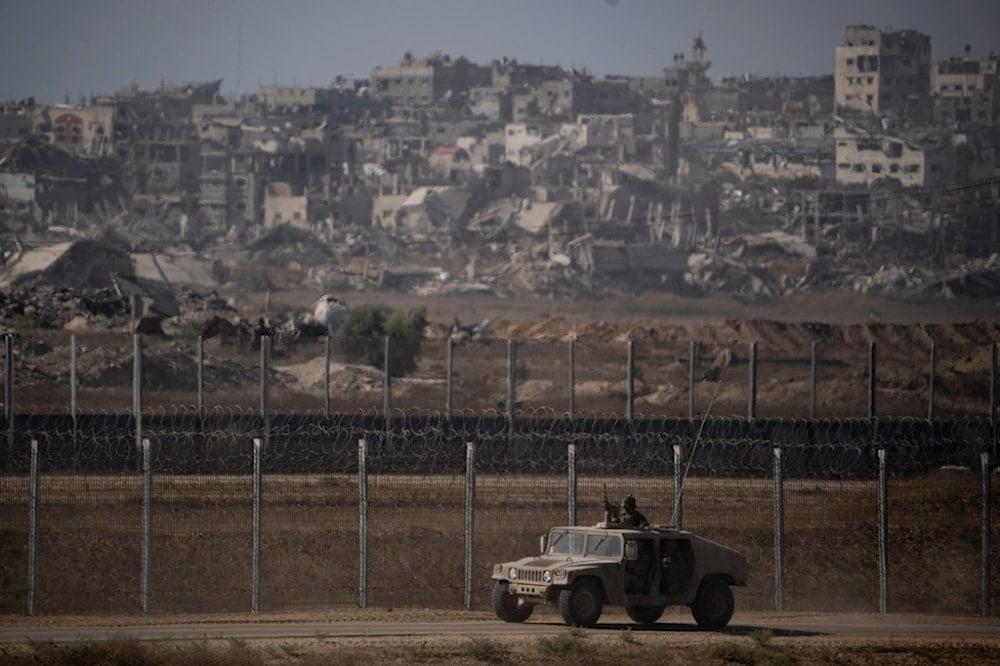CIA's Burns, Biden advisors land in Cairo for ceasefire talks: Axios
The agenda includes the issue of reopening the Rafah crossing and fortifying security measures along the Egypt-Gaza border.
-

Israeli soldiers move near the separation line with Gaza, occupied Palestine, Monday, July 8, 2024 (AP)
Axios reported on Monday that CIA Director Bill Burns and President Biden's top Middle East adviser Brett McGurk are currently in Cairo for high-stakes talks with senior Israeli and Egyptian security officials.
The discussions center on the prospects of a ceasefire agreement alongside plans to "secure the volatile Egypt-Gaza border," as was reported by Axios.
This comes as Israeli Prime Minister Benjamin Netanyahu on Sunday issued a key demand ahead of the talks: a strict prohibition on alleged weapon smuggling into Gaza from Egypt.
While this stipulation isn't explicitly outlined in the proposed ceasefire agreement, US and Israeli officials are aiming to address the issue through efforts involving Egypt.
Read more: Israeli media: Protests ongoing amid calls for ceasefire, elections
McGurk, White House coordinator for the Middle East and North Africa, arrived in Cairo alongside Burns to initiate trilateral talks with Egyptian and Israeli counterparts.
A senior Israeli delegation, led by the director of Shin Bet, "Israel's" internal security agency, is also partaking in the discussions.
The agenda includes the issue of reopening the Rafah crossing and fortifying security measures along the Egypt-Gaza border.
Talks will also focus on strategies to prevent Resistance fighters from "re-establishing strongholds in northern Gaza" following any potential ceasefire agreement, according to Axios.
Following their engagements in Cairo, McGurk is set to travel to the territories under Israeli occupation for further consultations with Prime Minister Netanyahu and Security Minister Yoav Gallant.
Meanwhile, Burns is scheduled to proceed to Doha for discussions with Qatari and Egyptian intelligence officials, as well as "Israel's" Mossad director, regarding ongoing efforts to broker an exchange deal for Gaza.
Read more: Shin Bet chief visits Egypt for Gaza ceasefire talks
Serious Challenges Ahead
The outcomes of these diplomatic maneuvers are said to be pivotal for the region's stability. Yet, the Israeli side has been obstinate in reaching an agreement.
Many of the captives who have died in the past nine months were killed as a result of "Israel's" indiscriminate bombardment of Gaza. The Israeli blockade of the Strip has further exacerbated this issue.
On July 6, Reuters reported, citing a senior Hamas source, that the movement accepted a US proposal to begin talks on releasing Israeli captives, including soldiers and men, 16 days after the first phase of an agreement aimed at ending the Gaza war.
The Palestinian Resistance group withdrew its demand for "Israel" to commit to a permanent ceasefire before signing the agreement. Instead, it will allow negotiations to work toward this goal during an initial six-week phase, as reported to Reuters by an anonymous source due to the private nature of the talks.
Yesterday, a statement from the office of Israeli Prime Minister Benjamin Netanyahu said that the occupation retains the option to resume military operations in the Gaza Strip until all of the outlined goals of its onslaught on the blockaded strip are achieved, irrespective of the terms agreed upon in a prospective prisoner swap deal with Hamas.
Netanyahu's office emphasized that any agreement would permit the Israeli occupation to continue its military efforts until the complete objectives of the war of attrition on Gaza are met.
"The Prime Minister is continuing to insist on the principles that have already been agreed to by Israel," the statement read. "Any deal will allow Israel to resume fighting until all of the objectives of the war have been achieved."

 4 Min Read
4 Min Read








